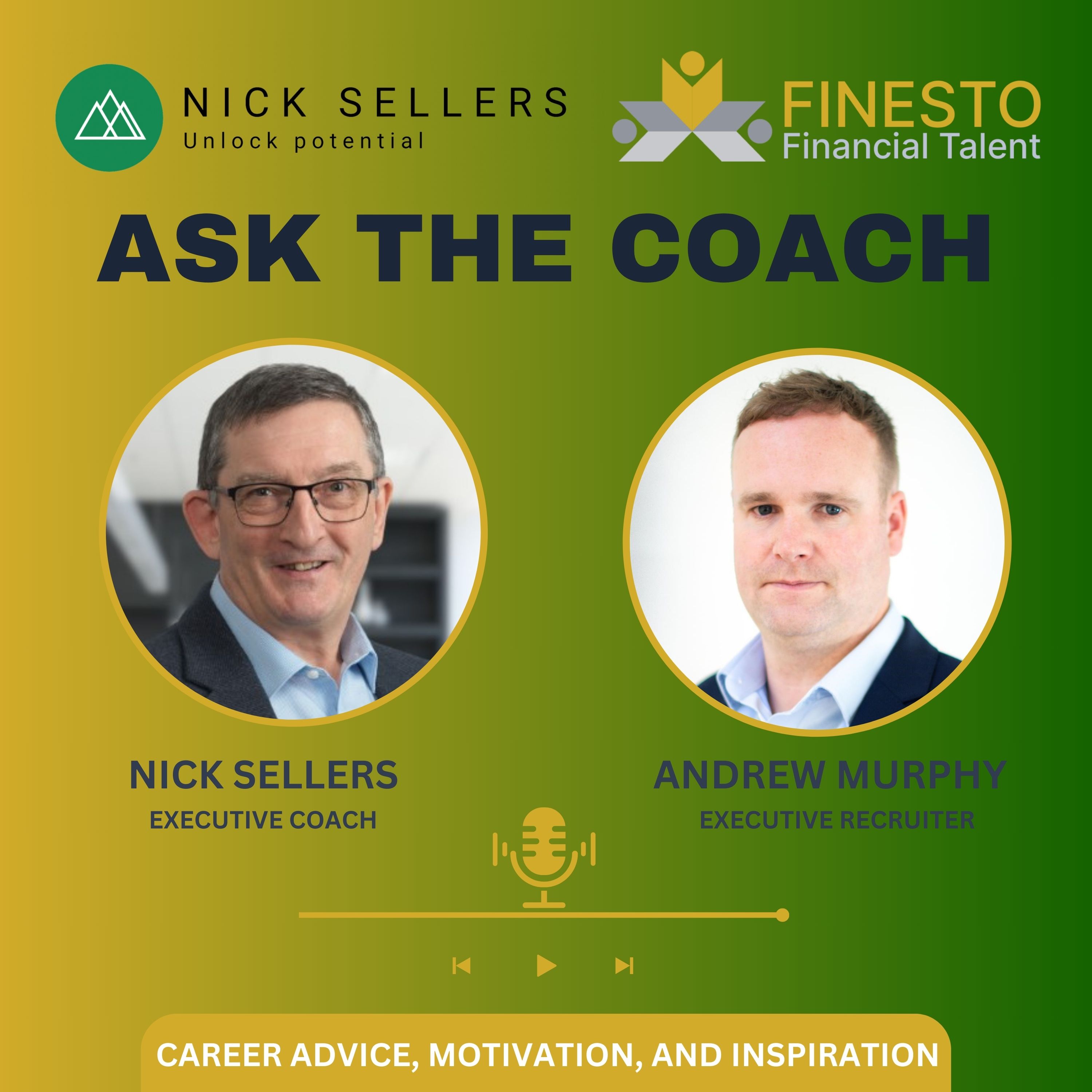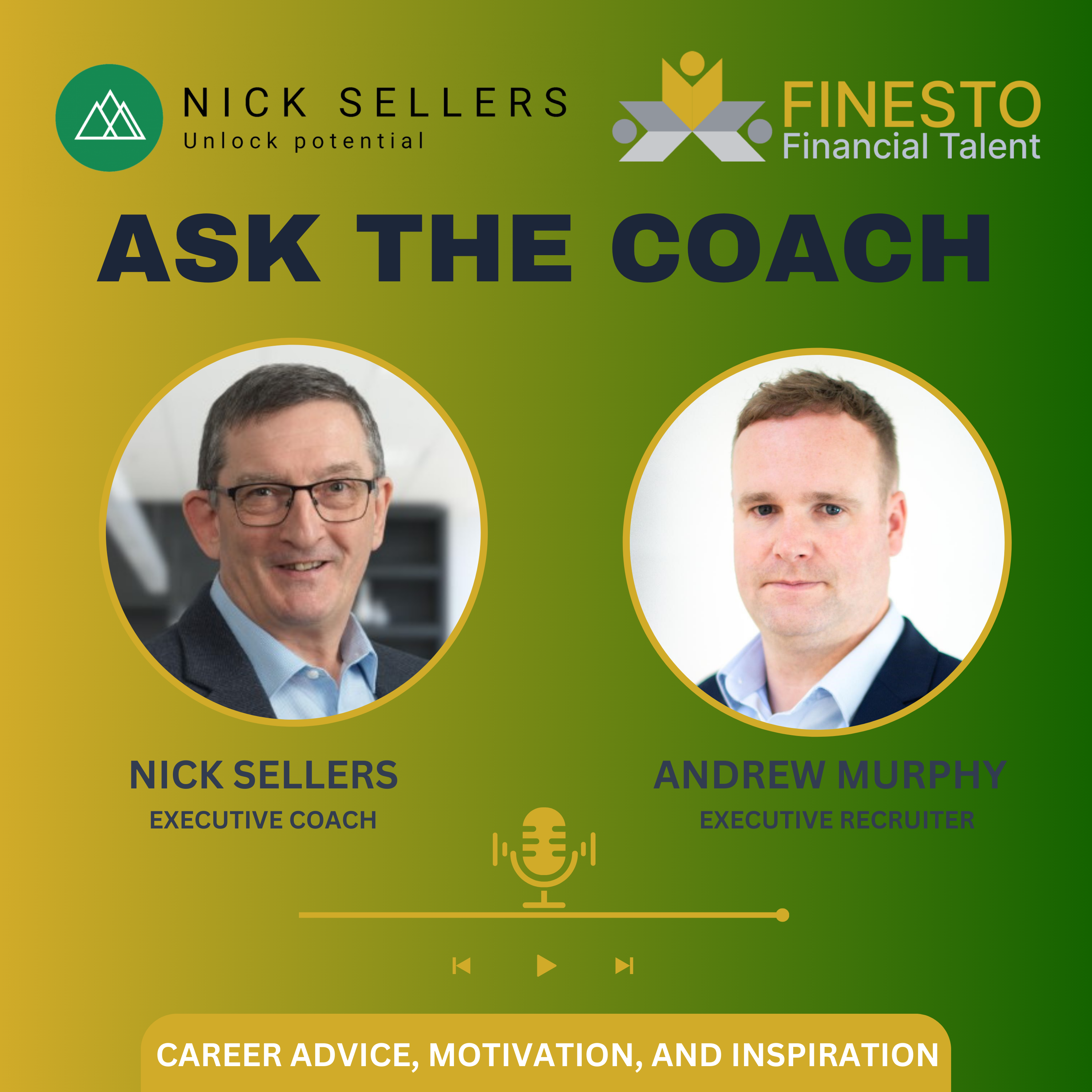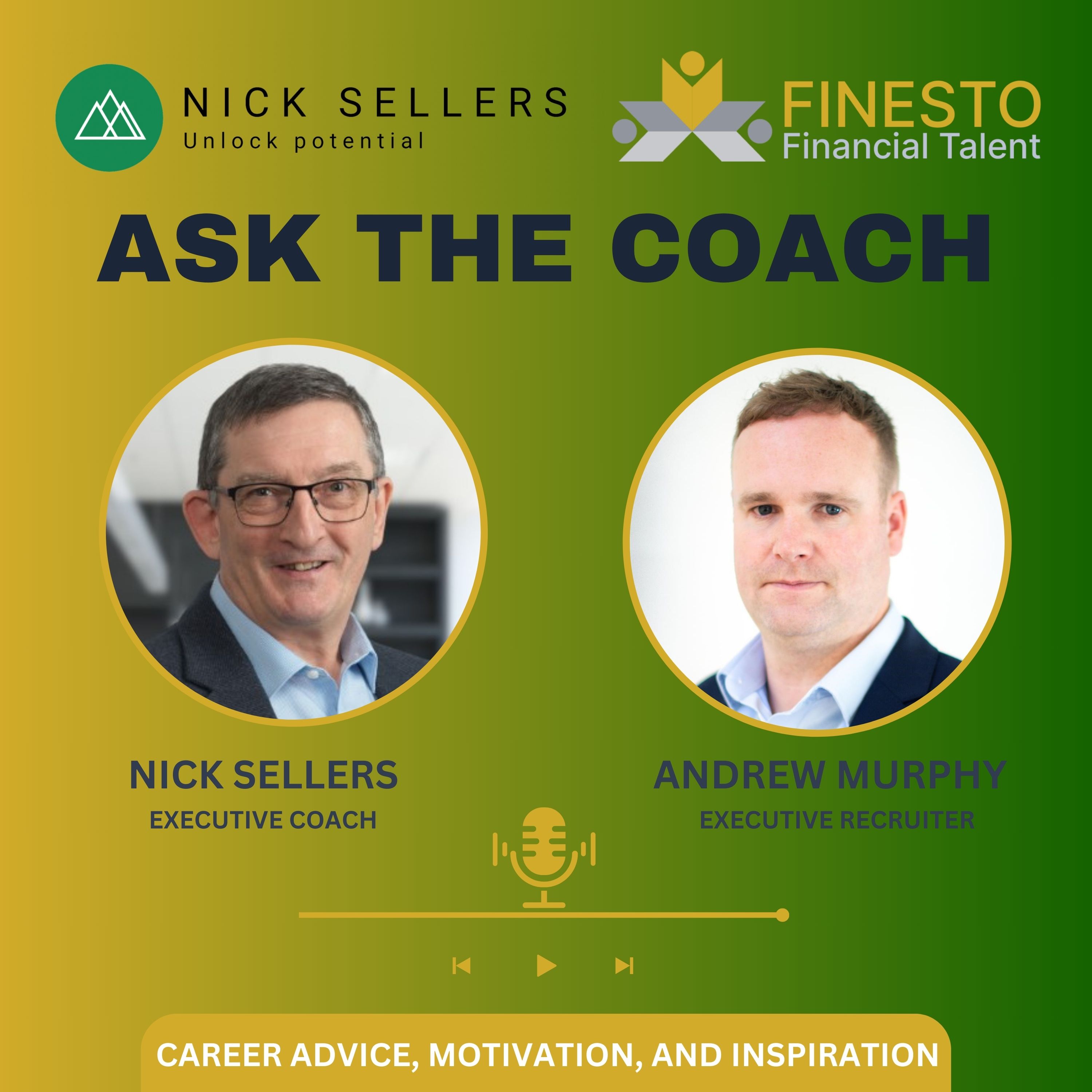Episode Transcript
[00:00:01] Speaker A: Ask the coach. Week two. Thanks again, Nick, for joining me. How's your week been so far?
[00:00:07] Speaker B: It's been a good week. Got off to a great start. I'm very happy with it. If you'd asked me the same question before this week started, I would have said mid week. Last week I was questioning how my week would go, but by the end of the week, it turned out well. I was reflecting on Friday and I was able to reflect that the week had actually picked up and done well.
[00:00:28] Speaker A: Always nice having a strong finish going into the weekend with a positive mindset.
So, first question, ask the coach. And it's a very common question I get, actually, is if someone's been in their position for a while, they often start to doubt whether their success is that they're simply a good fit for the role and particularly for that company. And I think quite often it makes people insecure about moving possessions, whether it's really their ability or just the situation they find themselves in. How can they overcome this mindset? Nick?
[00:01:05] Speaker B: Yeah. The lack of confidence thing, it does come where you're not feeling as though you're making progress.
It's normal, I think, for us to say, is it me or is it theme? To fully, properly, thoroughly get the answer, you've really got to look at the problem from a couple of different sides. From your own perspective, are you putting all the effort in? Are you actually dealing with things that are within your experience and your abilities as well? Sometimes experience and ability are two different things. So maybe you've been asked to do something that you've got very little experience about. Maybe you've been asked to do something like, I don't know if I use a bad example. Maybe you've been asked to lead meetings and actually you've got nervous in front of a group of people, so at least understanding what the problem is, where the problem lies. Or is it that actually what you're being asked to do isn't being thoroughly explained to you? Figure out what the source is and then take a look at what you could do to resolve that. Is it about gaining more experience? Is it about actually just pushing yourself on to go and test yourself a bit in an unknown environment? Or is it something to do with the fact that you and the company have moved apart? Sometimes our goals start to differ.
Sometimes our values start to differ. If the company's value is on profit, but you're actually very led by service, good quality and that kind of thing. It could be that actually the gap has opened up of some change somewhere. So thoroughly evaluating the situation before you make the change is really important because you may go from the frying pan into the fire if you just simply jump to a new job and then find out that, hey, the company's values are exactly like the old company's values, and within six months, you're stressed out.
[00:03:06] Speaker A: Yeah, good answer. Like, I've seen that happen fairly often. And another thing that's happening fairly often at the moment is a lack of promotions and career progression within certain organizations that may be overstaffed over the past couple of years, and now they're in a period of consolidation and there's less opportunities to push on in your career. It's a very common question I get, Nick, is if somebody's debating whether to stay in their current role or look for something new after missing out on a promotion, what advice can you give for someone to weigh up the pros and cons of each approach? And how can they regain their enthusiasm given the decision they decide to make?
[00:03:48] Speaker B: Right, good one.
First of all, I would say if you've been passed over for a promotion, if you didn't get a job that you really wanted to get, don't react.
Take time. Settle yourself down again, and think what your response to that will be.
When we react to anything in life, it's usually not a good outcome. You know, we fly off the handle, we lose our temper, we burn bridges. And when you're in a workplace environment, that's not a great situation to find yourself in. I'm sure we've all had experiences of telling the boss where to go put the job and all of that kind of thing. We don't want to do that. Respond, though, and your response will be measured and thought through, and your response will be something like, okay, I didn't get the job. Why didn't I get the job? Was it because I lacked experience, lacked training? Those are things that you can gain. You can talk to your line manager, you can talk to whoever you need to in the company and say, what do I need? What can the company help me with to scrub up better the next time that promotion opportunity comes? Or it might be that your well thought through response is to say, I think I am ready for this job. I didn't get it. I'm going to go test the marketplace and see whether or not I scrub up well in the eyes of another employer. But whatever you do, don't burn bridges. Don't throw your toys out of the pram.
Respond. Don't react.
[00:05:16] Speaker A: Yeah, great advice, Nick. I wholeheartedly agree with that. I think a considered approach, regardless of which option he takes the best route. And following on from that, I do get people ask me from time to time, and I had a question last week about someone who wanted to be more proactive about showcasing their contributions and they felt like they maybe weren't acknowledged and appreciated within the business. Could you offer some specific tactics or frameworks to help professionals track their accomplishments and communicate them effectively to the manager so that it can be taken into consideration for future performance discussions?
[00:05:57] Speaker B: Yeah, absolutely. Actually, I want to compliment whoever asks you this question because it's really good to be proactive. It's never good simply to sit back and expect people to notice you because when that happens, I think you do get overlooked. You can get taken for granted, but when being proactive, don't be over pushy, but do be thorough and do be structured. So if I was going to offer some specific tactics, it would be first of all, be proactive in work anyway. If you can take something extra on that will stretch you, that will add something extra for the business, be prepared to do it. Don't just wait until somebody asks you, but be measured about it as well. Make sure that you're making the offer when it's appropriate and not just every single time it happens. Don't look desperate, but in terms of how you showcase that, do keep a note of what you volunteered for. Do keep a note of what you completed. Do keep a note of feedback that you got from your line manager, from the project manager, from whoever it is in the business. When you've got records, you've actually got something to build a case around. And so it's almost like you've got to gather the evidence of, number one, what you offered to do, what you said you'd be involved in, and actually how that turned out. And then use that as you approach performance reviews, as you approach promotion opportunities. Bring all of that together and use it in the conversation so that you can argue, if you will, that you merit a bigger increase than the average or that you merit a promotion. And here's the proof of why. So I would say be proactive anyway, but also be thorough in terms of keeping records, keeping feedback and all of that kind of stuff.
[00:07:54] Speaker A: I like that. Agree.
Don't be too passive in your careers. My key takeaway and take ownership for.
[00:08:00] Speaker B: It and make sure actually, if I can add something else, just come to mind there as well, Andrew, and that is understand, use the opportunity to be proactive and volunteer for things or take things on. Use that opportunity to figure out what you want from the career as well. It may be that you get involved in a project or in a program and you think, this isn't for me. I don't really get the joy out of this that I thought I would do. In which case, hey, you tried. You've got a good case study there, a good example to share with somebody, but you'll also know what you don't want to do in the future. So it's a good way of actually kind of homing in on where your future lies in the business.
Yeah.
[00:08:41] Speaker A: Great advice, Nick. I like it.
Very common, I think just generally in life and social media probably doesn't help these days, is comparing ourselves to others, and it's the same in work situations. And very often I'll speak with professionals who are maybe comparing their progression or perceived career success to that of their colleagues, and invariably it'll lead them to feel inadequate.
How can people get past that comparison and focus on their own development?
[00:09:14] Speaker B: Yes, you know, I think you're right. Social media does have a lot to answer for. The one thing that people need to remember is that most of the content that you see in social media has been prepared. It's been curated. And so the great looking, smart sounding, extremely talented people that appear to be all over social media, what you don't see is you don't see the hours of preparation, the hours of practice, the hours of failure that went into that 32nd clip appearing. And life can be a bit like that as well. That when we are working alongside people, what we see is only a part of that person. We don't see the entire person. And so don't just take it that other people are doing well because they're louder than you, or they're doing well because they appear ahead of you in a league table or something like that. It could be that they're ahead of you in the league table because they've got 20 years more experience. It could be that they've been given a better choice of clients to work with. There's all sorts of reasons why you may not be able to draw a true apples to apples comparison with a colleague. So that's the comparison side.
Do get feedback though, and don't just rely on the feedback of one person. Your line manager may be a great person to get feedback from. They may also be a person who doesn't know how to give feedback and to give it constructively. So be careful. But getting feedback from three or four people that you trust and people that you trust are not just people that tell you that you're great, people that you trust are people who will give you an honest, balanced view of you in the workplace.
So these may be people that you work alongside. They may be people in other departments that you work with on projects or however that goes.
It's a bit like in mobile phone network. They have this network, they have this thing called triangulation, where they can actually pinpoint roughly where a phone is in a cell because the signal bounces off three towers. Let's say for you to be able to pinpoint exactly where you are, you need to go to three or four different sources.
I would use that kind of feedback to your advantage.
Then when it comes to your own development, you need to know where you want to go. Yeah, you can take training courses, yes, you can do all manner of things, but actually having a good idea, a clear idea about what direction in your career you want to go. So having qualified, let's say, as an accountant, is there a certain kind of client you want to work with? Is there a certain kind of cause that you want to work on behalf of? And once you actually pinpoint what really, you've heard me use this expression before, what feeds your soul? Once you've figured out what really feeds your soul, you will draw yourself in that direction and your development needs will be met by growing that way.
So hopefully that's a reasonable enough answer to that question. But don't worry about comparing yourself to other people. You know, the grass is always greener on the other side just on that point.
[00:12:33] Speaker A: Nick, if somebody. It's a very common conversation I have. As you know, people really don't know what they want from their career. And I think we've all been there at various crossroads in our careers, and it's an incredibly common conversation. What would be the process if you were to sit down with somebody who came to you and said, nick, I've got to point my career. I just don't know what I want to do next.
What would be your process in terms of sitting down with them or picking up with them and taking them through that discovery process to explore what they're really looking to get from their career?
[00:13:11] Speaker B: It's an interesting journey that you end up going on.
I would probably need to spend a little bit of time with them, understanding how they see themselves, how they see themselves at some point in the future, what success looks like for them. But then we take a look at what are their values, what are their achievements in the last year, what are their disappointments, their beliefs as well. Sometimes we hold ourselves back because we don't believe that we've got the experience or the ability or the skill. So it's fitting all of these things together. So, Andrew, to answer your question, yes, there is an answer available. It may not be immediately obvious.
The answer can be arrived at through conversation with a good coach. You'd expect me to say that, but it's not easy. Sometimes people go on a long journey of discovery before they wake up one morning and realize that what they were looking for has been right in front of them the whole time. Other times, they realize that what they're looking for is nowhere around them and they've got to go off somewhere else.
[00:14:19] Speaker A: Yeah. Understand from Billy. I appreciate Nick, again, this may be a kind of loaded question, being a coach yourself, but should people seek those discovery journeys? Is it something people should be seeking throughout their career, or will people know when the time is right to make that discovery journey?
[00:14:40] Speaker B: I think it's good for us to reflect regularly, Andrew, if I use myself as an example, not always a good thing to do, but I keep a reflective log, and I do that because writing things down actually helps me to get my thoughts in order.
And actually, here's an admission for you. I'm a coach and I actually have a coach. So a bit like they say, physician, heal thyself and everything. The truth is that actually even coaches turn to another coach in order to make sure that everything's balanced. In terms of that discovery stuff, I think it's good for us to actually constantly be reflecting on whether we're happy with where we're at. And if we're not 100% happy, why is that? Sometimes we lay the blame for unhappiness at the feet of something which is completely not the reason.
We might say I'm unhappy at work when actually it's a personal relationship outside of work that's actually the root cause of the unhappiness. It could be that the work's actually okay. It's the boss that's the problem, because the boss never explains anything clearly.
It could be that your values are that you want to do great quality work, but the company's values are that they actually just want to stack them high, sell them cheap. And so that kind of reflection, it's good for us to constantly take a look at what it is that's causing the friction.
[00:16:10] Speaker A: Great advice, Nick. Brilliant.
Thanks, Nick. I really appreciate you taking the time to go through some common questions I get. And hopefully you'll be free next week for, for week three. Thanks again.
[00:16:24] Speaker B: Yeah, my pleasure, Andrew. Thanks very much for inviting me on.
[00:16:27] Speaker A: Thanks, Nick.
Cheers.
[00:16:34] Speaker B: Nick.
[00:16:35] Speaker A: Sorry, I threw in a couple extra at the end there.


